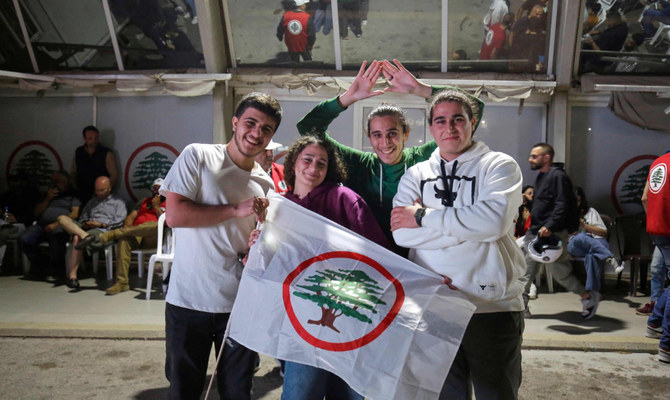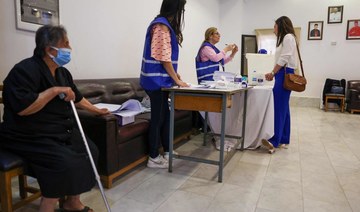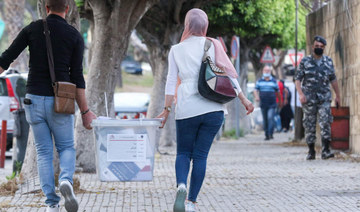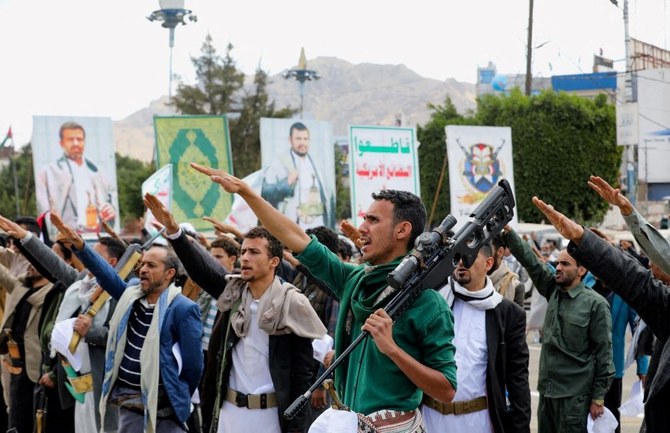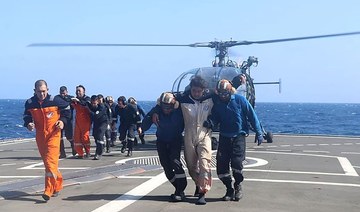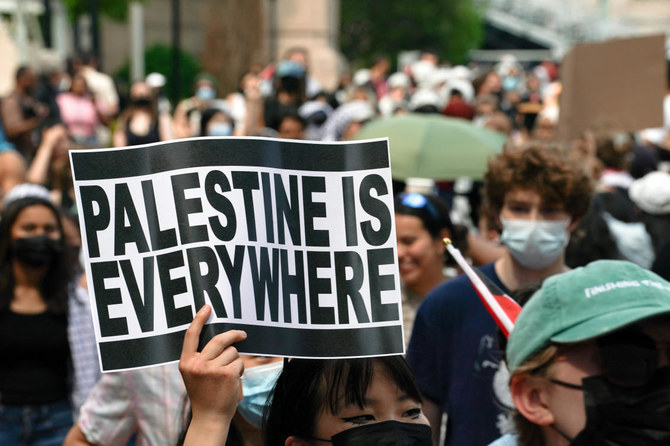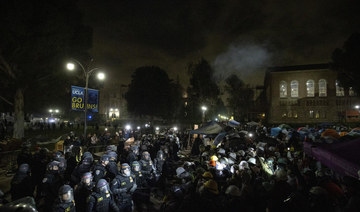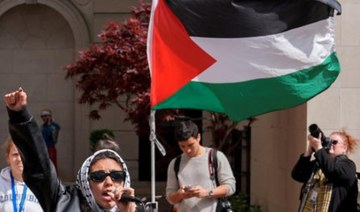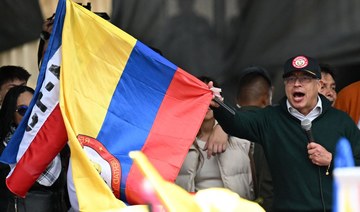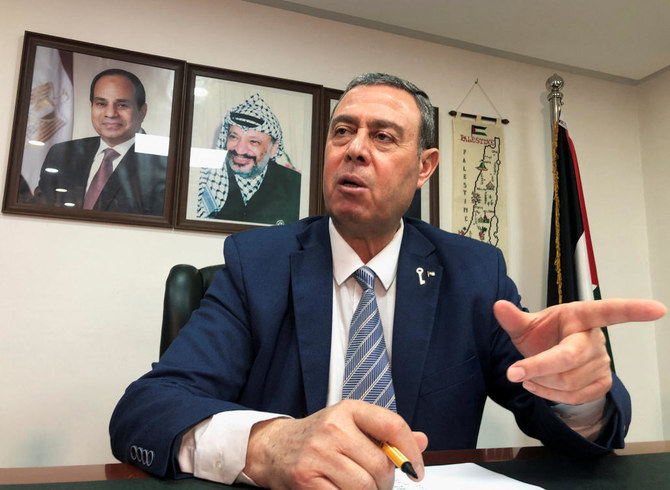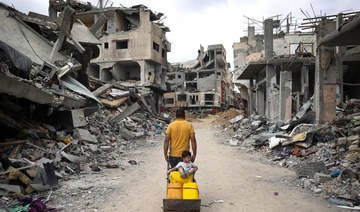BEIRUT: The Lebanese public headed to polling booths on Sunday to elect a new parliament against the backdrop of an economic meltdown that is transforming the country.
The armed forces were deployed on roads leading to polling stations.
Arab and foreign observers moved between polling stations to oversee the electoral process but refused to make any declarations, noting that their observations will be included in a report.
The Lebanese Association for Democratic Elections registered dozens of violations, such as delegates being placed under “pressure and harassment,” and threats of expulsion.
The association criticized “the deputy registrars’ failure to carry out their tasks, which results in the cancellation of votes.”
The Supervisory Commission for Elections noted “hundreds of irregularities resulting from breaches of electoral silence.”
Irregularities were also noted by the Association for Democratic Elections. It accused “candidates and politicians, including President Michel Aoun,” of breaches.
Aoun and his wife cast their votes in his hometown in the southern suburbs of Beirut.
He urged voters to avoid being “impartial in a matter as important as choosing the ruling system.”
Politicians and clergymen, some accompanied by their children, cast their votes in front of the cameras in casual clothing.
Tensions reached a peak on Lebanon’s long electoral day in the final hours before polls closed, especially in areas with a strong Hezbollah presence.
The town of Fneidiq in Akkar witnessed several violent clashes and confrontations, prompting calls for the rapid intervention of the Lebanese Army and Internal Security Forces.
Despite the severe polarization that preceded the elections, the turnout was about 25.6 percent by 3 p.m. across Lebanon, according to figures from the Ministry of Interior.
The highest turnout was recorded in Jbeil–Kesserwan, where it reached 42 percent.
However, it did not exceed 22 percent in the Beirut II district, 17 percent in the Beirut I district and 12 percent in Tripoli.
Voters are electing 128 new parliamentary deputies. In some competitive regions, voters were divided due to many competing lists, particularly in Beirut and the north.
The turnout was high in places where party electoral machines were active and effective.
Parties and some electoral institutions invited a large portion of the public to cast early votes, but asked others to vote in the afternoon before the sealing of ballot boxes at 7 p.m., after studying voters’ orientations during the day.
These tactical practices also included offering money to voters.
An officer in one of the electoral machines of one of the lists of change in Beirut told Arab News that “Hezbollah, the Amal Movement and the Association of Islamic Charitable Projects (Al-Ahbash) are more organized than others.”
Based on Arab News’ observations in Beirut, delegates of some lists were completely absent in some of the polling stations, while delegates of party lists were present.
Sunni voters in Beirut stepped back from their boycott in light of the decision by Saad Hariri — former prime minister and head of the Future Movement — to suspend his political activity.
One voter, Neamat Naoum, told Arab News: “I had to vote and not boycott. I voted for the interest of others. In previous elections, I used to vote for Saad Hariri and before him, for his father. But Saad bargained a lot and conceded, and the mafias are now controlling us.”
She added: “Why did he do that? We are not against him but we are looking forward to the future. I hope those I voted for are better. I don’t know.”
Bilal Haykal, who was accompanied by his son Yehia to the Khalid bin Al-Walid polling station in the Beirut II district, said that at first, he decided to boycott the election entirely.
“However, when Dar Al-Fatwa called on people to cast their votes, I decided to exercise my constitutional right. I voted for the candidates calling for change after studying their resumes,” he added.
“I don’t want to vote for Hezbollah and its allies, so they won’t control the country’s decisions, knowing that in politics, there is no black and white. That’s how the country is.”
The number of voters in the Beirut II district reached about 370,000. They casted votes to elect 11 deputies out of 118 candidates distributed between 10 complete and incomplete competing lists.
The Lebanese Association for Democratic Elections said that “pro-Hezbollah chants in front of and inside Lycee Abdel Kader polling station in Beirut affected the turnout.”
In the Beirut I district, about 135,000 people voted to elect eight deputies.
Voting in the district was viewed as an avenue to retaliate against the ruling class, since the area was hardest hit by the Beirut port explosion two years ago.
Many voters publicly said that “they will not reelect their killers.”
Thirty-nine candidates competed in the district, where the competition was mainly between the Free Patriotic Movement, the Lebanese Forces and the Phalanges Party.
In Tripoli, 11 lists competed for eight parliamentary seats. The number of voters reached 438,254.
In Jbeil, people showed up to polling booths to elect two Maronite deputies and a Shiite deputy among 21 candidates.
The competition mainly focused on the potential for a Hezbollah-affiliated deputy or a Shiite deputy in opposition to the party.
Dr. Mahmoud Awad, a candidate on the Lebanese Forces list, was physical assaulted, according to a statement by his party.
“Members of Hezbollah harassed the Lebanese Forces’ delegates in one of the stations, resulting in the intervention of the Army Forces and the removal of the aggressors and the delegates from the center,” the statement said.
Lebanese Forces delegates were subjected to harassment in Jezzine by members of Hezbollah and the Amal Movement, including inside a polling station.



